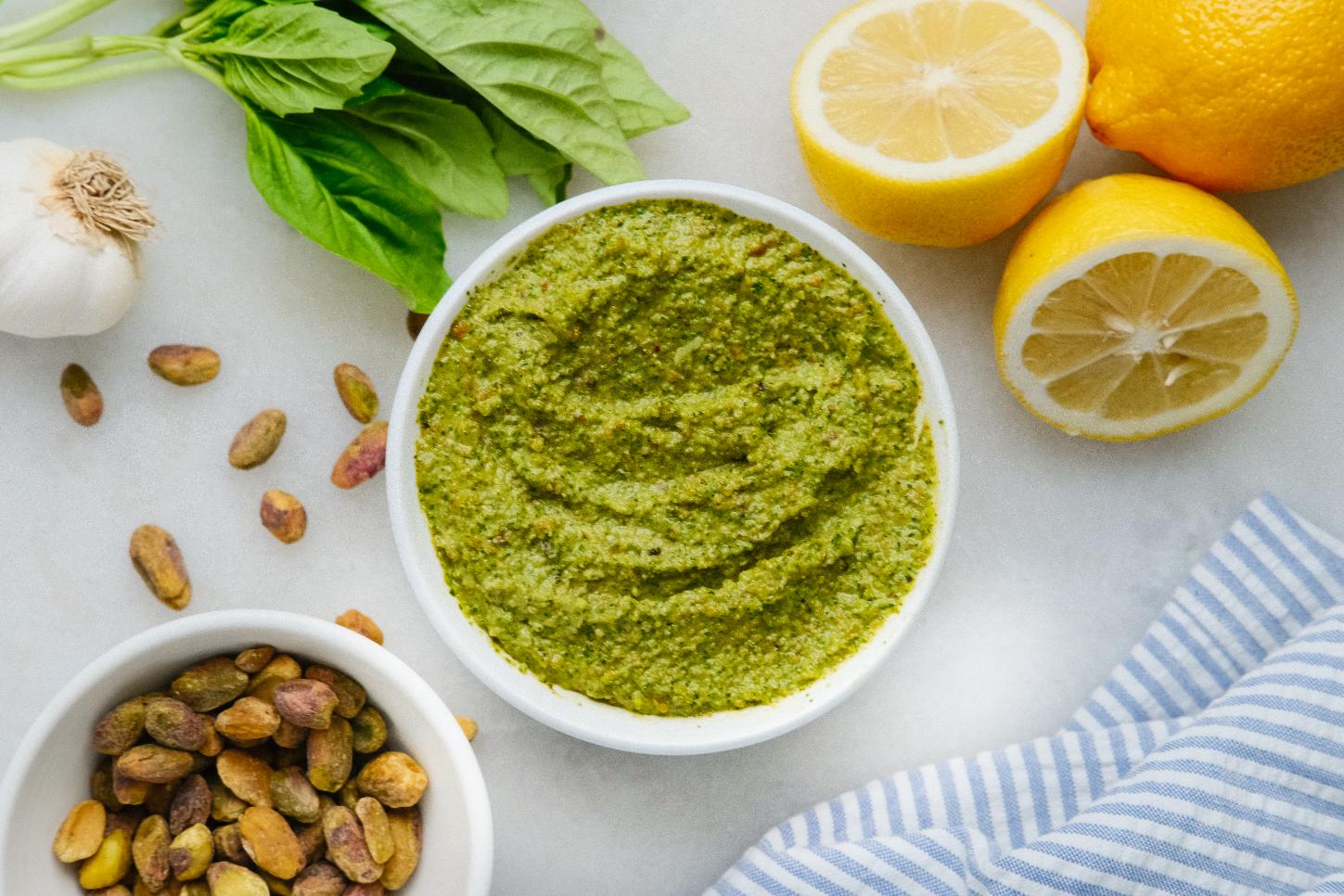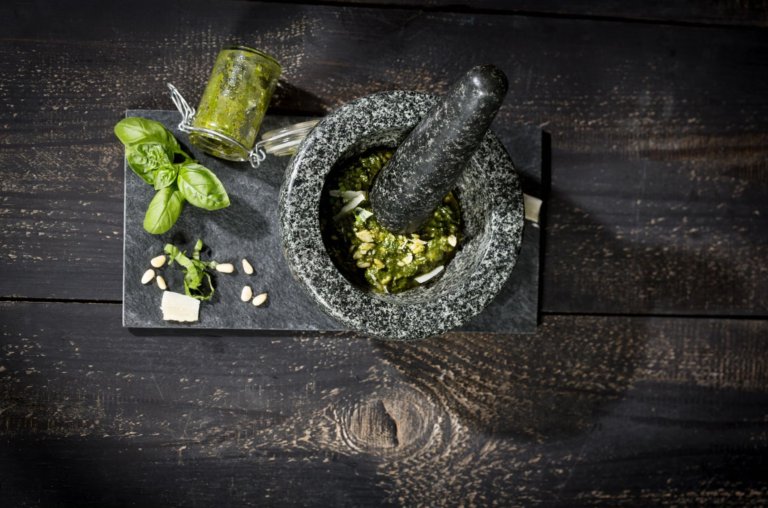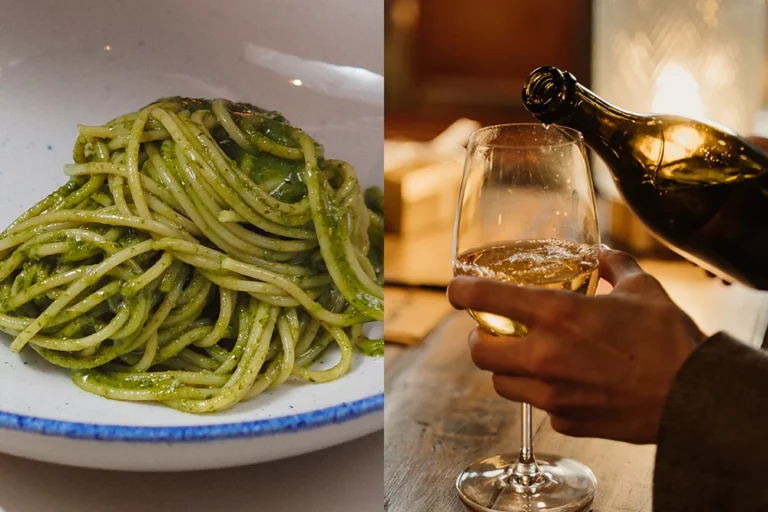Pistachio pesto is a delightful and versatile twist on the traditional Italian pesto sauce. Combining the rich, nutty flavor of pistachios with the fresh zest of basil and the smoothness of olive oil, this sauce brings a unique and vibrant touch to any dish.
Whether you’re spreading it on sandwiches, tossing it with pasta, or using it as a dip, pistachio pesto is sure to impress with its creamy texture and distinctive taste.
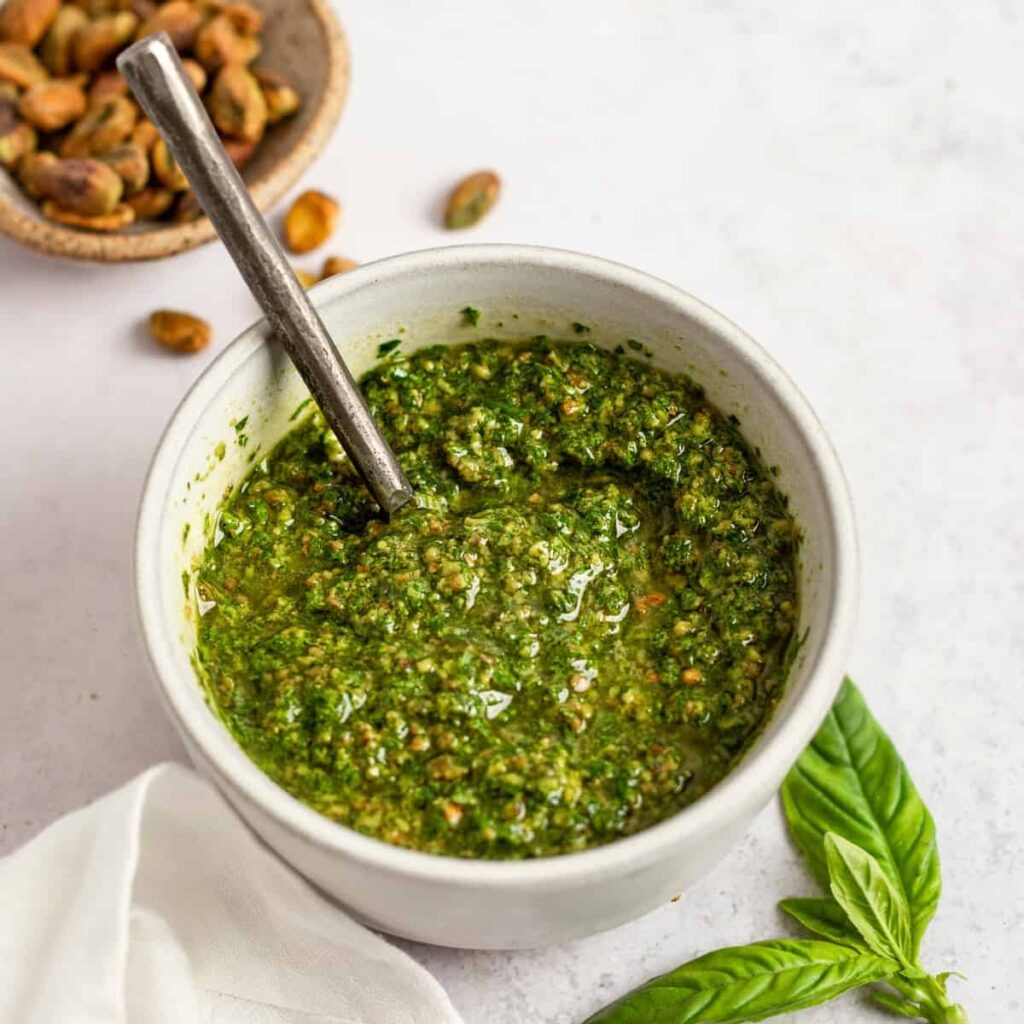
History and Origins
Traditional Italian Pesto
Traditional Italian pesto, known as “pesto alla genovese,” originated in Genoa, a region in Liguria, Italy. This classic sauce is made with fresh basil leaves, pine nuts, garlic, Parmesan cheese, and olive oil, all blended together to create a fragrant and flavorful condiment. Pesto has been a staple in Italian cuisine for centuries, celebrated for its simplicity and rich, aromatic qualities.
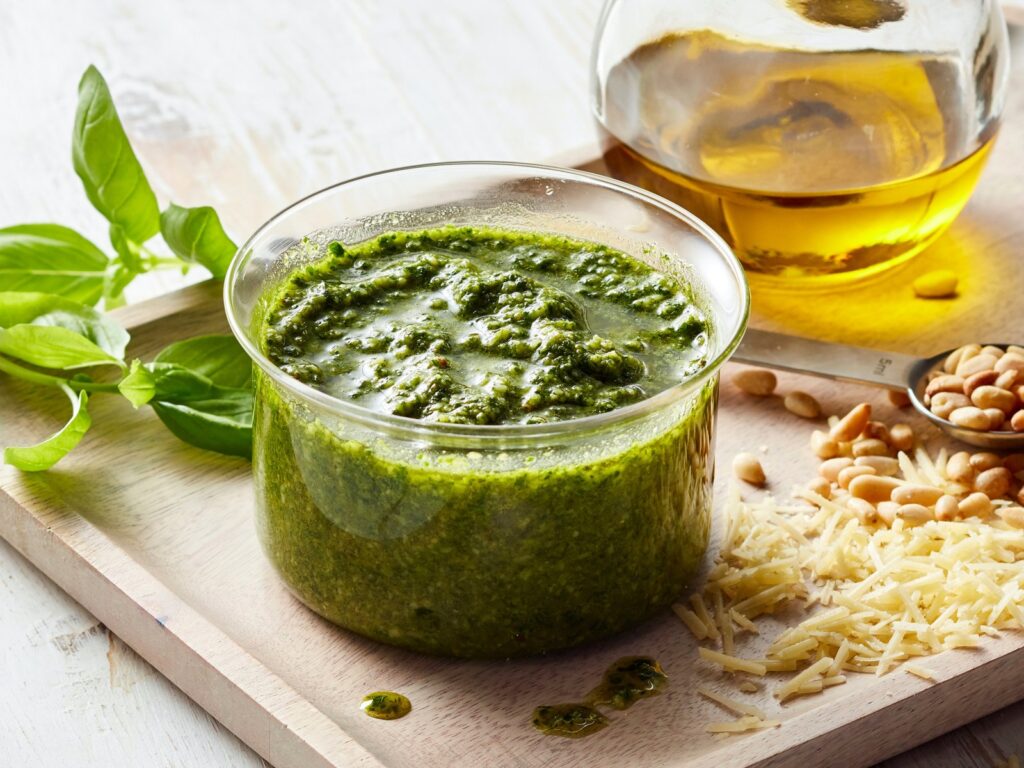
Evolution to Pistachio Pesto
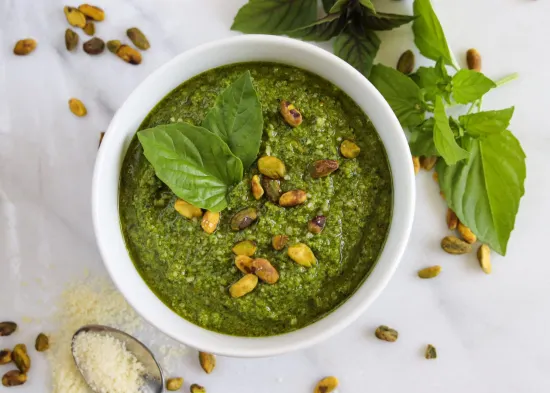
As culinary exploration expanded, chefs and home cooks alike began experimenting with variations of traditional recipes. The evolution to pistachio pesto is a testament to this creativity. By substituting pistachios for pine nuts, the pesto gains a new depth of flavor and a creamier consistency. This variation has grown in popularity, especially in regions where pistachios are abundant and widely appreciated.
Health Benefits
Nutritional Profile of Pistachios
Pistachios are not only delicious but also packed with nutrients. They are an excellent source of protein, fiber, and healthy fats, particularly monounsaturated and polyunsaturated fats. Additionally, pistachios provide essential vitamins and minerals, such as vitamin B6, thiamine, potassium, and magnesium. Consuming pistachios can support heart health, aid in weight management, and provide a boost of energy.
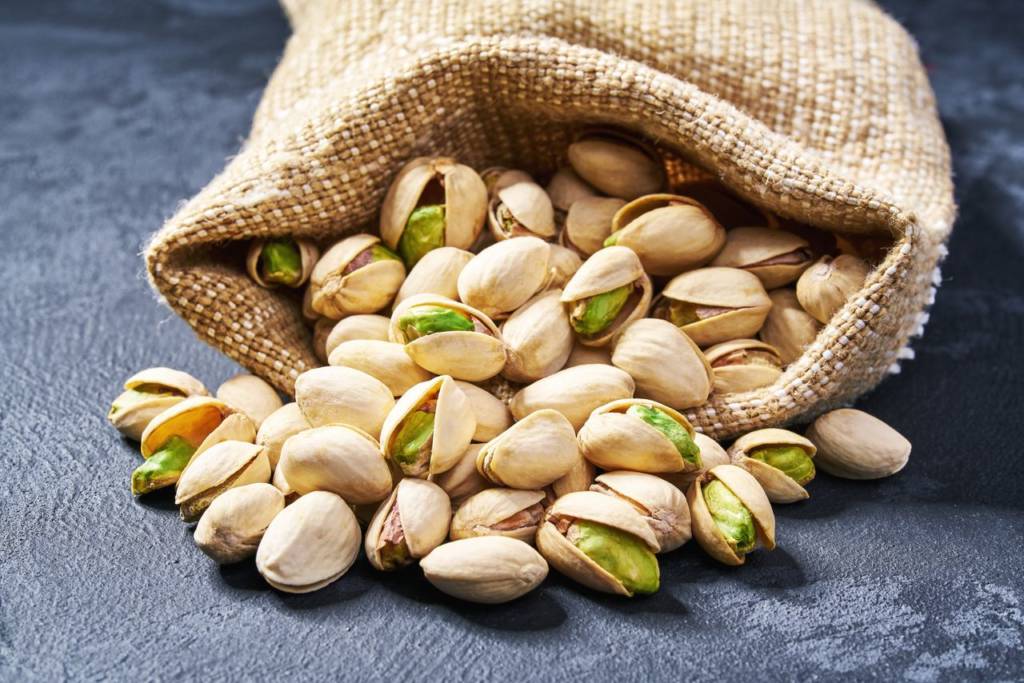
Benefits of Olive Oil and Basil
Olive oil, a key ingredient in pesto, is renowned for its health benefits. Rich in monounsaturated fats and antioxidants, olive oil can reduce inflammation, support cardiovascular health, and improve overall well-being. Basil, another primary component of pesto, is not only flavorful but also offers numerous health benefits. It contains vitamins A, C, and K, as well as antioxidants and essential oils that can help reduce stress, boost immunity, and promote digestive health.
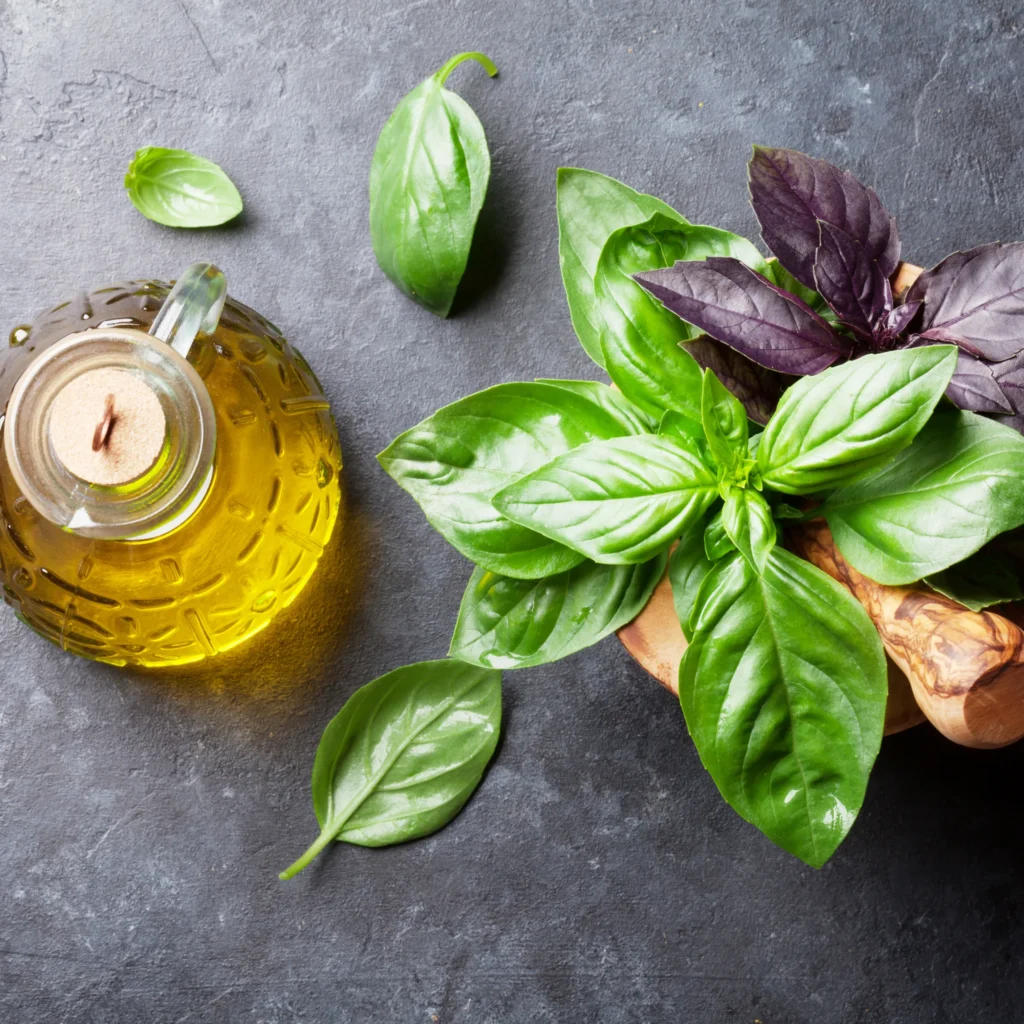
Basic Pistachio Pesto Recipe
Ingredients
To make a classic pistachio pesto, you will need the following ingredients:
- 1 cup shelled pistachios
- 2 cups fresh basil leaves
- 1/2 cup grated Parmesan cheese
- 3 cloves garlic
- 1/2 cup extra-virgin olive oil
- Salt and pepper to taste
- Lemon juice (optional)
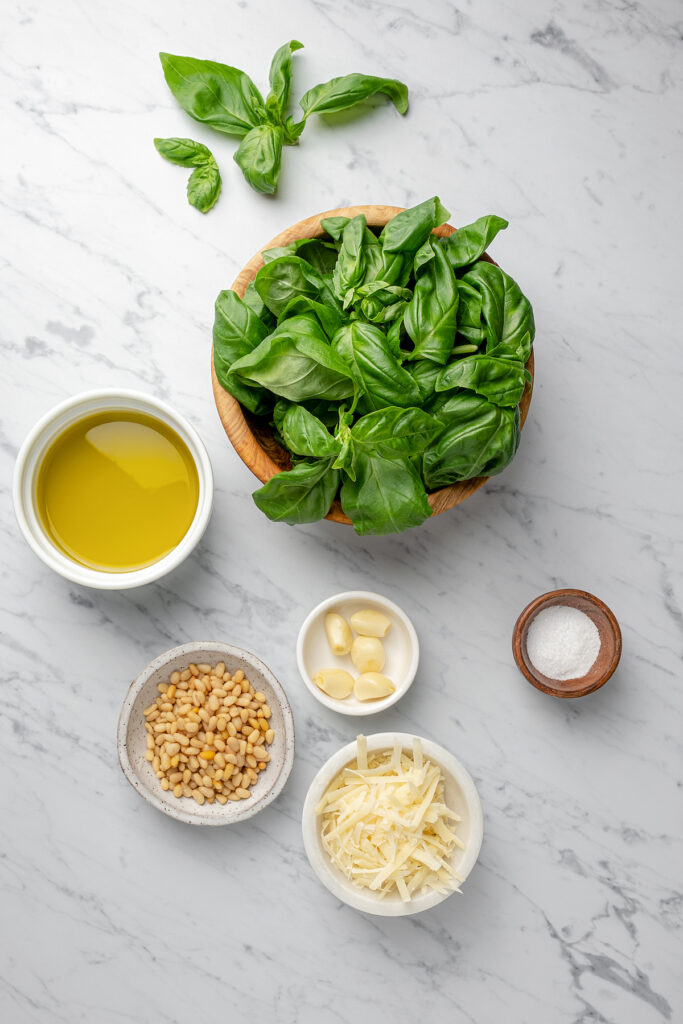
Step-by-Step Instructions
- Prepare the Ingredients: Start by shelling the pistachios if they are not already shelled. Wash and dry the basil leaves thoroughly.
- Blend the Dry Ingredients: In a food processor, combine the pistachios, basil leaves, grated Parmesan cheese, and garlic cloves. Pulse until the mixture is finely chopped.
- Add Olive Oil: With the food processor running, slowly drizzle in the olive oil. Continue blending until the pesto reaches a smooth and creamy consistency. If the mixture is too thick, you can add a little more olive oil or a splash of water to achieve your desired texture.
- Season to Taste: Add salt and pepper to taste. If desired, add a squeeze of lemon juice for a hint of acidity and brightness.
- Store and Serve: Transfer the pistachio pesto to a jar or airtight container. Store in the refrigerator for up to a week. Enjoy it as a spread, dip, or sauce with your favorite dishes.
Tips for Perfect Pistachio Pesto
Selecting the Best Ingredients
The quality of your ingredients can significantly impact the flavor of your pistachio pesto. Here are some tips for selecting the best ingredients:

- Pistachios: Choose fresh, unsalted, and shelled pistachios for the best flavor and texture.
- Basil: Opt for bright green, aromatic basil leaves. Avoid leaves that are wilted or yellowing.
- Olive Oil: Use high-quality extra-virgin olive oil for its rich flavor and health benefits.
- Parmesan Cheese: Freshly grated Parmesan cheese will provide a more robust flavor than pre-grated options.
- Garlic: Fresh garlic cloves are essential for a vibrant and pungent taste.
Common Mistakes to Avoid
To ensure your pistachio pesto turns out perfectly, avoid these common mistakes:
- Over-blending: Over-blending can cause the basil to bruise and oxidize, resulting in a dull, brownish pesto. Pulse the ingredients just until combined for a bright green color.
- Using Low-Quality Olive Oil: Low-quality olive oil can impart a bitter taste. Invest in good-quality extra-virgin olive oil for the best results.
- Not Toasting the Pistachios: Lightly toasting the pistachios before blending can enhance their flavor and add a toasty note to your pesto.
Variations and Enhancements
Vegan Pistachio Pesto
For a vegan-friendly version of pistachio pesto, simply omit the Parmesan cheese. You can add nutritional yeast for a cheesy flavor or use a vegan Parmesan substitute. This version is just as creamy and delicious as the traditional recipe.
Dairy-Free Options
If you’re looking for a dairy-free option, replace the Parmesan cheese with a dairy-free alternative or omit it altogether. You can also add a handful of nutritional yeast to achieve a similar cheesy flavor. This variation is perfect for those with lactose intolerance or dairy allergies.
Spicy Pistachio Pesto
For those who enjoy a bit of heat, consider adding a spicy twist to your pistachio pesto. Incorporate a small amount of crushed red pepper flakes or a fresh chili pepper into the blend. This addition will give your pesto a delightful kick, perfect for spicing up your favorite dishes.
Lemon Pistachio Pesto
To add a bright, citrusy flavor to your pesto, include some fresh lemon zest and a splash of lemon juice. The lemon complements the nuttiness of the pistachios and the freshness of the basil, creating a refreshing and tangy variation that pairs well with seafood and salads.
Herb-Infused Pistachio Pesto
Experiment with different herbs to create unique flavor profiles in your pistachio pesto. Try adding fresh parsley, mint, or cilantro to the mix. Each herb will bring its own distinct aroma and taste, offering endless possibilities for customizing your pesto to suit various dishes.
Pesto with Different Nuts
While pistachios provide a distinctive flavor, you can also try making pesto with other nuts for a different twist. Walnuts, almonds, or cashews can all be used as substitutes for pistachios. Each type of nut will impart its own unique flavor and texture, allowing you to explore a range of delicious pesto variations.
If you’re exploring the world of pesto, our main guide on making and using pesto is a must-read.
Serving Suggestions
Pistachio pesto is incredibly versatile and can be used in numerous ways to enhance your meals. Here are some serving suggestions to inspire you:


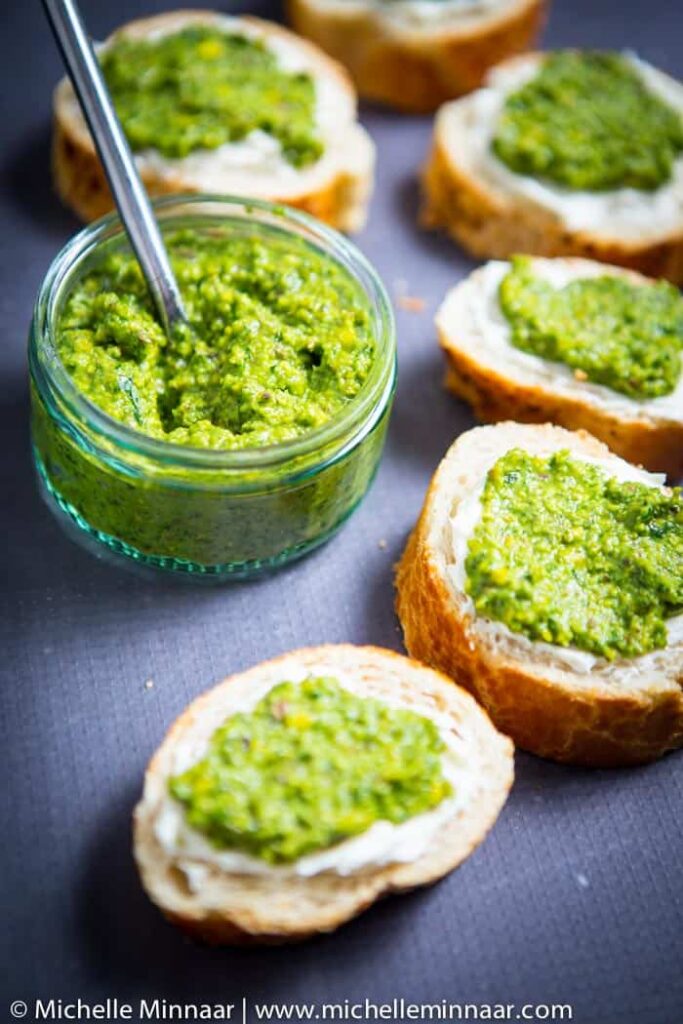
- Pasta: Toss your favorite pasta with pistachio pesto for a quick and delicious meal. Add grilled chicken or shrimp for extra protein.
- Sandwiches: Spread pistachio pesto on sandwiches or wraps for a flavorful alternative to mayonnaise or mustard. It pairs wonderfully with grilled vegetables, mozzarella, or turkey.
- Salads: Use pistachio pesto as a salad dressing by thinning it with a bit of lemon juice or vinegar. It adds a rich, nutty flavor to green salads, grain bowls, and pasta salads.
- Dips: Serve pistachio pesto as a dip for fresh vegetables, breadsticks, or crackers. It’s a tasty and nutritious option for appetizers or snacks.
- Pizza: Use pistachio pesto as a base sauce for pizza instead of traditional tomato sauce. Top with your favorite ingredients like cheese, arugula, and prosciutto for a gourmet twist.
- Grilled Meats and Seafood: Drizzle pistachio pesto over grilled meats, fish, or seafood to add a burst of flavor. It works particularly well with lamb, salmon, and scallops.
FAQs
Conclusion
Pistachio pesto is a delicious and versatile condiment that adds a unique twist to traditional pesto recipes. With its rich, nutty flavor and creamy texture, it can elevate a wide range of dishes from pasta to sandwiches, salads, and more.
By understanding the history, health benefits, and various ways to customize and serve pistachio pesto, you can create a flavorful and nutritious addition to your culinary repertoire. Whether you’re a seasoned cook or a pesto novice, this ultimate guide provides everything you need to know to master the art of pistachio pesto.
Disclosure: Our blog contains affiliate links to products. We may receive a commission for purchases made through these links. However, this does not impact our reviews and comparisons. We try our best to keep things fair and balanced, in order to help you make the best choice for you.

